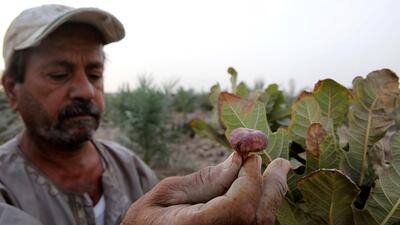At the turn of the last century, merchants in the nascent port city of Kuwait began retrofitting their dhows to carry cargo far more precious than the pearls they took to the east or the spices they brought back: water.
The city’s population was booming - not because of the discovery of oil, which would come decades later, but because of the trade that had brought both wealth and a wave of new immigrants.
With the boom came an increased demand for water that could no longer be met by Kuwait’s underground aquifers, leading to the start of water shipments from Iraq’s Basra region to the north.
The dhows would typically set sail after the heat of mid-day and arrive in Basra by nightfall. Filling their holds with the semi-sweet water of the Shat Al Arab river would take about two hours, and the boats would return home in time for sunrise in Kuwait, where the water distributors would deliver it to households.
Today, the roles have been reversed. Kuwait, which now gets most of its water from desalination plants, recently sent tankers loaded with fresh water Basra in an attempt to abate public anger over water scarcity there.
For more than a month, demonstrators have taken to the streets of Iraq’s southern cities to demand water supply and other basic services. At least 14 people have been killed and hundreds wounded.
The Emir of Kuwait, Sheikh Sabah Al Ahmed, told Prime Minister Haider Al Abadi during a phone call in July that “the stability of Baghdad is among Kuwait’s chief concerns”.
_____________
Read more
Abadi sacks Iraq's electricity minister after protests
Iraq says Saudi to sell power at a fraction of Iran's price
Iraqi farmers fight to save cattle as drought tightens its grip
_____________
Baghdad has yet to resume payment of the $4.6 billion still owed to Kuwait as reparations for the damage to its oil production caused by the Iraqi invasion in 1990. But Iraq’s water woes, along with a power supply crisis, has prompted Kuwait, along with Saudi Arabia, to step in to ensure stability in the regional heavyweight.
During the protests in Basra a photo was circulated on social media purporting to show militants attacking oil facilities in northern Kuwait. The Kuwaiti interior ministry dismissed the claims, but it still conjured up memories of Iraq’s invasion.
Although the protests have not affected Kuwait so far, concerns remain as Iraqi families are forced to purchases water at the rate of $13 (Dh48) a tonne – a cost many in the southern provinces, which have some of the highest rates of unemployment, cannot afford.
“It’s a shame that I am demanding water in 2018. Water I ask for ... nowadays people travel by plane! Alas humanity! I have oil that feeds the entire world,” one man told a local television channel.
Iraq exported 3.543 million barrels per day (bpd) of crude from its southern ports in July, according to the oil ministry, generating revenue of about $7.6 billion based on an average sale price of $69.163 per barrel.
Yet the south of Iraq suffers from high unemployment, patchy electricity and brackish water – all of which is compounded by viciously hot summers.
Rainfall this year has been scarce and the rivers of Iraq, including the Tigris and the Euphrates, are drying up and water reservoirs are only 10 per cent full. In 2003 the High Level Committee for Disaster Risk Reduction had already identified drought as one of the most serious crises facing the country.
In June, the government suspended farming of rice, corn and other cereals that require major irrigation. The drought has halved the area under cultivation in Iraq this summer compared to last year, according to Deputy Agriculture Minister Mahdi Al Qaisi.
“Iraq’s water crisis has been brewing for some time, but it’s really coming to a head now because of an unfortunate combination of factors” said Peter Schwartzstein, a non-resident fellow at the Washington-based Centre for Climate and Security.
“Turkey and Iran are holding back more water than ever, with both countries seemingly taking advantage of Iraq’s instability over the past year,” said Mr Schwartzstein. “As the downstream state, there’s little Iraq can do about this.”
On the outskirts of Basra city, where agriculture was once the main source of income, water shortages have forced farmers to abandon their crops and search for jobs in the city.
“Agriculture has been in a state of slow collapse in southern Iraq for years and while there are many reasons, water is perhaps chief among them,” said Mr Schwartzstein.
“Many farmers have ditched their fields and moved to the slum outskirts of Basra, Baghdad and other cities, as their yields have shrunk. With overly salty water, they simply can’t get a return on their investment.”
Local authorities estimate that some 30 per cent of cattle across the south have been lost during the drought, either dying from thirst or sold off for slaughter. That is a major blow for the estimated 475,000 families in the region who make their living from livestock.
Iraq is expected to begin talks with Saudi Arabia soon to discuss a long-term fix to the shortage of the country’s basic needs.

